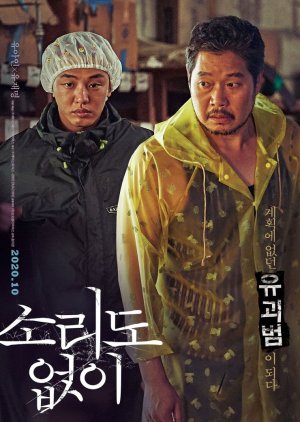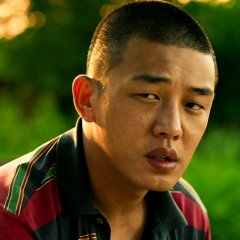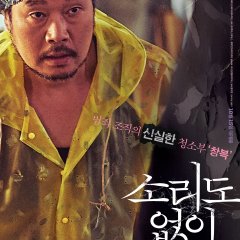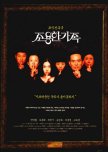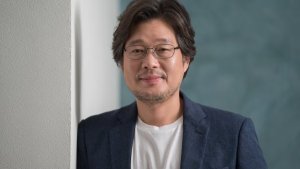 Yoo Jae Myung Cast as Lead in "Open Murder Contract" Co-starring with Lee Sun Kyun
Yoo Jae Myung Cast as Lead in "Open Murder Contract" Co-starring with Lee Sun Kyun Tae In, who lost his voice, and Chang Bok make their livings cleaning up crime scenes. One day, they are left to take care of a kidnapped girl named Cho Hee, who was raised to be a kindhearted sister, obligated to take care of her brother in a male-oriented family. In fact, she was abducted instead of her brother, but because it has always been obvious to stand in for her brother, she manages to keep calm and swiftly read the situation she is placed in. Even when she sees Tae In cleaning up brutal crime scenes, she keeps her calmness, acting the 'good girl' inside her, even taking care of Tae In’s little sister. Tae In starts to open himself up to Cho Hee, while Chang Bok, who was supposed to come back with Cho Hee’s ransom, becomes out of contact. Now Tae In has to go through the situation all alone. (Source: koreanfilm.or.kr) Edit Translation
- English
- Русский
- Română
- magyar / magyar nyelv
- Native Title: 소리도 없이
- Also Known As: Without a Sound , Solido Eobsi , Sorido Eobsi
- Screenwriter & Director: Hong Eui Jung
- Genres: Thriller, Comedy, Crime, Drama
Where to Watch Voice of Silence
Cast & Credits
- Yoo Ah InKim Tae InMain Role
- Yoo Jae Myung Main Role
- Moon Seung AhBae Cho HeeMain Role
- Jo Ha SeokJung HanSupport Role
- Seung Hyung BaeJoon CheolSupport Role
- Im Kang SungYong SeokSupport Role
Reviews

This movie really make you hear the voice of the silenced ones
I think it's one of my favourites this year if not THE fav. I think that the title "Without a Sound" refers not that much to a mute protagonist, but to the fact that in Korean (but not only) society many voices are unheard, many bad, criminal things happen without media and people being loud about those problems, because it's hard to handle, because of corruption, because it's an uncomfortable topic or because more powerful people make them keep quite...Chang Bok said to Tae In "what will he do without him?", because people with impairments and disabilities, people from very poor families, orphans like himself really need more help, but instead are being mistreated and cast out like trash and in some cases really have no choice (if they don't want to starve). Not to mention mafia, human traffic for organs, prostitution, paedophilia... The movie may seem almost comic (I did laugh hard in many scenes), but it does make you think about some really heavy topics with many strong metaphors and question yourself what did YOU do about it, since you surely had more possibilities to make a change than the protagonist, a person without a voice (physically and metaphorically, although he did make many people "hear" him at the end of the movie). It also obviously blurs the line between good and evil, since the protagonists do some criminal things, but also some good things, so it's not them being evil in their nature, but some of their actions. It makes us question ourselves what’s right and wrong, what’s good and bad what do we think about a certain situation and if those beliefs depend on motives and circumstanced or if our moral is absolute.

A story with several meanings
Although Tae-in reluctantly took in the young girl, Cho-hee, to stay at his place, they eventually started gaining trust and opening up to each other. To me, this shows symptoms of Stockholm syndrome, which is a psychological connection formed with their captors during captivity. Although Tae-in did not intend to abduct Cho-hee, ultimately he is still a kidnapper who hid her away from the public eye and stopped her escape attempts. Cho-hee bonded well with Tae-in’s younger sister, and at times, it indeed felt like she was truly happy there and did not want to leave the place. Although we don’t know much about her family, but it was brought up several times in the movie that her family obviously doted on the son more, and she was actually not the intended kidnap target as well, highlighting the issue of patriarchy in her family.However, at times the line between whether if Cho-hee is suffering from Stockholm syndrome or not is quite blurred, as both Tae-in and Cho-hee could not make up their minds on how they perceived each other. For Tae-in, he just wanted to quickly get the job done and send Cho-hee away, however he still had a conscience when he knew that Cho-hee’s life was in danger. As for Cho-hee, she couldn’t decide to trust Tae-in or not, but ultimately, she makes her decision at the ending, which I will not spoil here.
Since Yoo Ah In has no lines in the movie at all, his actions and body languages are quite obvious and easy to understand, without being too exaggerated. From his expressions, ranging from joy, to worry and desperation, his character, Tae-in was able to communicate well and relate his thoughts with the on-screen characters and with the audience watching the movie. In an interview, Yoo Ah In described his character as such, “Tae-in doesn’t speak. I don’t think he is unable to speak at all as he makes some noises sometimes. He refuses to communicate with the world for some reasons.”
Overall, this movie has various blurred lines, on the overarching theme of good and evil – for the audience to interpret in their own ways, such as the lead characters working in a job that is essentially a crime, but what they do could also be rationalised as okay; and if Tae-in and Chang-bok are actually good or bad, as they are kidnappers, albeit kind-hearted ones who actually looked after their abductee. The movie ending itself is something that we did not really expect, but it does match the overall theme well.

